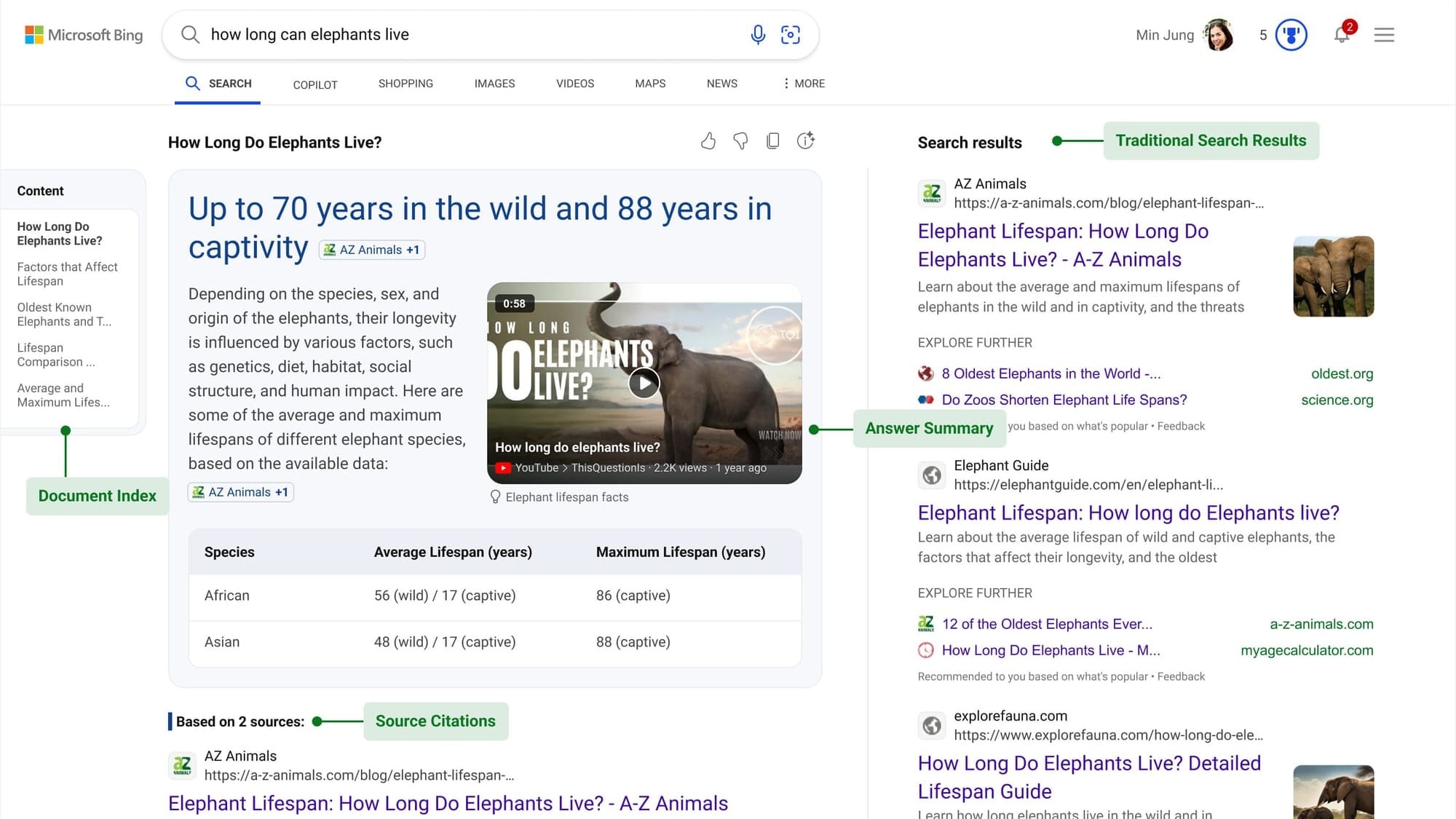On July 2024, Bing announced a groundbreaking update to its search engine, introducing Generative Search, a cutting-edge feature that promises to redefine the way we interact with search engines. In this blog post, we'll delve into the details of this exciting development, exploring its key aspects, functionalities, and potential impact on users and the broader industry.
The New Feature: Generative Search
Generative Search is a significant departure from traditional search engines, which typically rely on keyword-based queries and provide a list of relevant links. Instead, Generative Search uses advanced AI algorithms to generate human-like text based on the user's query, providing a more conversational and intuitive search experience.
I’m excited to share an early look at Bing’s new generative search experience. It combines the power of LLMs and SLMs with Bing’s search results to generate a more delightful and efficient UX layout. This is another meaningful step forward in our evolution of AI-powered search.
— Jordi Ribas (@JordiRib1) July 24, 2024
Key Aspects:
- Natural Language Processing (NLP): Generative Search leverages NLP to understand the context and intent behind the user's query, allowing for more accurate and relevant results.
- Text Generation: The AI-powered engine generates human-like text based on the user's query, providing a more engaging and interactive search experience.
- Conversational Interface: Generative Search introduces a conversational interface, enabling users to interact with the search engine in a more natural and intuitive way.
The Company Behind It: Bing
Bing, a leading search engine developed by Microsoft, has been continuously innovating and improving its search capabilities. With Generative Search, Bing aims to revolutionize the search landscape, providing users with a more personalized and interactive experience.
Relevant Background:
- Microsoft's AI Investments: Microsoft has been heavily investing in AI research and development, with a focus on integrating AI capabilities into its products and services.
- Bing's Evolution: Bing has undergone significant updates and improvements since its launch in 2009, with a focus on enhancing its search capabilities and user experience.
Technical Specifications and Capabilities
Generative Search is built on top of Bing's existing search infrastructure, leveraging advanced AI algorithms and machine learning models to generate human-like text. The feature is designed to work seamlessly across various devices and platforms, including desktop, mobile, and voice assistants.
Technical Details:
- AI Models: Generative Search uses advanced AI models, such as transformer-based architectures, to generate human-like text.
- Training Data: The AI models are trained on a massive dataset of text from various sources, including web pages, books, and user-generated content.
- Scalability: Generative Search is designed to handle a large volume of queries, ensuring a fast and responsive user experience.
Comparison to Previous Versions and Competitor Offerings
Generative Search represents a significant departure from traditional search engines, offering a more conversational and interactive experience. Compared to previous versions of Bing, Generative Search provides a more personalized and engaging experience, with a focus on understanding the user's intent and context.
Competitor Analysis:
- Google's Search: Google's search engine, while highly effective, still relies on traditional keyword-based queries and provides a list of relevant links.
- Other Search Engines: Other search engines, such as DuckDuckGo and StartPage, offer more private and secure search experiences but lack the conversational interface and AI-powered text generation of Generative Search.
Potential Impact on Users and the Broader Industry
Generative Search has the potential to revolutionize the way we interact with search engines, providing a more personalized and engaging experience. This development could also have significant implications for the broader industry, including:
Potential Impact:
- Improved User Experience: Generative Search provides a more conversational and intuitive search experience, making it easier for users to find what they're looking for.
- Increased Competition: Generative Search could increase competition in the search engine market, driving innovation and improvement in search capabilities.
- New Opportunities for Content Creators: Generative Search could provide new opportunities for content creators, enabling them to produce more interactive and engaging content.
Reactions from Industry Experts and Early Users
Industry experts and early users have expressed excitement and interest in Generative Search, praising its innovative approach to search and potential to revolutionize the industry.
Reactions:
- Industry Experts: "Generative Search represents a significant breakthrough in search technology, offering a more conversational and interactive experience." - Search Engine Expert
- Early Users: "I'm impressed by the accuracy and relevance of the results. Generative Search makes searching feel more natural and intuitive." - Early User

Conclusion
Generative Search is a groundbreaking development in search technology, offering a more conversational and interactive experience. With its advanced AI algorithms and machine learning models, Generative Search has the potential to revolutionize the way we interact with search engines. As the search landscape continues to evolve, it will be exciting to see how Generative Search shapes the future of search and information discovery.







